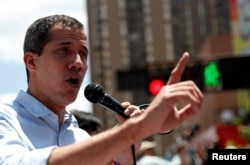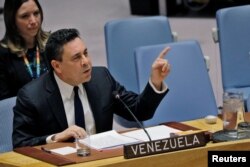U.S. Vice President Mike Pence called on the United Nations on Wednesday to "stand up for democracy" and recognize Venezuelan opposition leader Juan Guaido as that country's legitimate leader.
"While other international bodies have acted, the United Nations and this Security Council have refused to act," Pence told a meeting of the U.N. Security Council called by the United States.
"But now that nations across this hemisphere have spoken, the time has come for the United Nations to recognize interim president Juan Guaido as the legitimate president of Venezuela and seat his representative in this body," Pence added. "This body should revoke the credentials of Venezuela's representative to the United Nations, recognize interim president Juan Guaido, and seat the representative of the free Venezuelan government in this body without delay."
Pence said the United States is working on a U.N. resolution to recognize the legitimacy of the government of Guaido and urged the international community to support it.
"Stand with the Venezuelan people as they rise up to restore freedom, democracy and libertad to their nation," he said, using the Spanish word for freedom.
It was not immediately clear whether the U.S. is seeking to accomplish this in the Security Council — where Russia would certainly veto any such measure — or in the General Assembly, where all nations have a vote.
Under U.N. procedures, government delegations are accredited through the organization's Credentials Committee. If a majority of the committee's nine members votes to revoke the credentials of the delegation of President Nicolas Maduro, then the matter would move to the General Assembly where a simple majority vote would be required to affirm their decision. The U.S. could also circumvent the committee and bring a resolution directly to the General Assembly for a vote.
So far, 54 nations have joined Washington in recognizing Guaido's government after he declared himself interim president earlier this year. The U.N. has 193 member states, and it is not clear how many would support such a resolution. Many states are hesitant to take measures interfering in the internal affairs of other countries, lest they find themselves on the receiving end of such measures in the future.
Pence reiterated that the United States would continue to exert diplomatic and economic pressure to bring about a peaceful transition to democracy in Venezuela, "but all options are on the table."
"On what legal basis are all options on the table?" asked Venezuelan Ambassador Samuel Moncada. "On what legal basis can one country threaten another with war here around this room?"
Moncada reiterated that Washington's attempt to send humanitarian assistance to his country is a pretext for a military invasion and called on the United States to lift its sanctions if it really cares about the Venezuelan people.
"We are not asking for handouts or for anybody's money, we have our own money," Moncada said. "But the government of Trump terrorizes economic actors, traders and international agencies so they won't actually touch the money that we are willing to offer for the services that they can provide."
Humanitarian crisis
Pence announced an additional $60 million in humanitarian assistance to support Venezuelans and the host communities that have taken them in. That is in addition the $200 million the U.S. has already allocated in aid.
U.N. humanitarian chief Mark Lowcock told council members that a quarter of Venezuela's population — some 7 million people — are in need of assistance, from food to medical care to clean water and sanitation.
"Let me be clear from the outset that there is a very real humanitarian problem in Venezuela," Lowcock told the council. He said needs are "significant and growing."
The United Nations has appealed for $109 million for this year to assist people inside Venezuela, but has so far received $49.1 million.
An estimated 3.7 million people have fled the country, the overwhelming majority since 2015. Those are the official U.N. estimates, but the U.N. refugee agency representative for Venezuelan refugees and migrants, Eduardo Stein, told the council that the number would "go well above the 4 million mark" if people who have left through irregular means also are counted.


